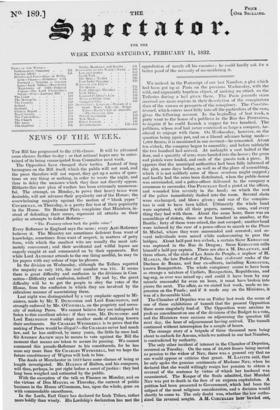NEWS OF THE WEEK.
TIIE Bill has progressed to the 57th clause. It will be advanced some clauses further to-day ; so that rational hopes may be enter- tained of its being emancipated from Committee next week.
The Opposition have changed their tactics. Instead of long harangues on the Bill itself, which the public will not read, and the press therefore will not report, they get up a series of ques- tions on any thing or nothing, in order to waste the night, and thus to delay the measure which they dare not directly oppose. Hitherto this new plan of warfare has been extremely unsuccess- ful. The attempt, on Monday, to prove that heavy taxes were desirable, will not advance their popularity out of the House; the overwhelming majority against the motion of "blank paper" CounrE NAY, on Thursday, is a pretty fair test of their popularity in the House. Sir ROBERT PEEL complains that Ministers, in- stead of defending their errors, represent all attacks on their policy as attempts to defeat Reform- " The Treasury echoes back the public voice."
Every Reformer in England says the same; every Anti-Reformer believes it. The Ministry are sometimes deficient from want of knowledge, sometimes from want of respect, in matters of petty form, with which the smallest wits are usually the most inti- mately conversant; and their accidental and wilful lapses are eagerly caught at and, commented on by their opponents. But while Lord ALTHORP attends to the one thing needful, he may tie his papers with any colour of tape he pleases.
In the division on Wednesday, although the Tellers reported the majority as only 168, the real number was 185. It seems there is great difficulty and confusion in the divisions in Com: mittee—Difficulty and confusion, indeed! By and by, the great difficulty will be to get the people to obey the votes of the House, from the confusion in which they are involved by the ridiculous manner of ascertaining them.
Last night was distinguished by a very emphatic appeal to Mi- nisters, made by Mr. T. DUNCOMBE and Lord EBRINGTON, and strongly enforced by Mr. O'CONNELL, on the propriety and neces- sity of making Peers. We cannot believe they are indisposed to listen to this 'excellent advice : if they were, Mr. DUNCOMBF. and Lord EBRINGTON would adopt another mode of making known their sentiments. Sir CHARLES WETHERELL is to prove that the making of Peers would be Megan—Sir CHARLES never had much law, and he has outlived, by many years, the little he once had. Sir ANDREW AGNEW says he means to vote against the Bill the moment that means are taken to secure its passing. We cannot commend this pseudo-Reformer to his constituents, for he has none any more than Sir CHARLES WETHERELL, but we hope the future constituency of Wigton will look to him.
The deeds at Manchester in 1819 have some chance of being at length investigated. Mr. RULTON of Hulton, and his compeers, will thus, perhaps, be put right before a court of justice: they had long been weighed and estimated by the public. With the exception of the talk on Finance on Monday, and on the virtues of Don MIGUEL on Thursday, the current of public 'business in the House ofCommons, has, upon the whole, gone on with commendable smoothness.
In the Lords, Earl Grim. has declared for Irish Tithes, rather more boldly than wisely. His Lordship's declaration has met the approbation of nearly all his enemies : he could hardly ask for a better proof of the necessity of reconsidering it.


























